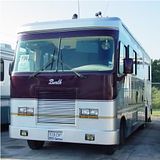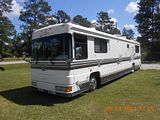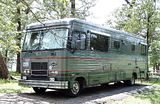Go to...  | Start A New Topic  | Search  | Notify  | Tools  | Reply To This Topic  |  |
 8/09 8/09 |
i'm looking to put shore power at home when not in storage i have a 50 amp service does this get wired 110 or 220 Thanks Sean 97 regal 460/ford chass. | ||
|
 |
Sean, Most all RV 50 amp is 220 4 wire. You'll have 2 grounds. Usually white and green. Nick | |||
|
| The Old Man and No Barth |
You're not getting 240v through your 50A service. Everything works just as well in your RV when you use a 30A or a 15A adapter. You just can't use all your 120v appliances at once without popping a breaker. If all you want out of your shore power at home is to maintain your batteries, or operate a TV or microwave, or perhaps run a single 1500W electric heater, all you need is a pigtail or adapter to plug your 50A cord into a standard house-type outlet. No need to rewire your house. OTOH, if you plan to run both air conditioners, the TV, microwave, & a couple electric heaters all at once, you'll need to juice up your house power with a 50A circuit. Most of us carry adapters, as most older RV parks, & those in small towns, have 30A, not 50A RV service, & there are occasions when you don't even have 30A service available, like parking in your friend's driveway, or your own, when all you have is 15A service. | |||
|
| First Month Member |
The standard RV 50 Amp wire connection has two hot legs, one ground pin and one neutral pin. Each hot leg reads 120 volts to neutral. That is how you use it. Each hot leg reads 120 volts to ground. That is for safety. Each hot leg reads 240 volts to the other hot leg. That is only for reference. You don't use it, but you check it. If it is not that way, you could fry the neutral with unbalanced loads. Neutral and ground are connected at the service entrance only, as far as the park or your house goes. As a general rule, one leg of the 50 amp service runs all of the coach except for the rear air conditioner, which is powered by the other leg. . 84 30T PeeThirty-Something, 502 powered | |||
|
"5+ Years of Active Membership"  |
This is one of my pet peeves. Bill has it right, the original use of a '50 Amp' service was to add an additional 20 Amp circuit to the original 30 amp RV service, to power a second air conditioner. That would be a special linked breaker of on leg of 30 amps and another leg of 20 amps. This would total 50 amps at 110 volts. Not 50 amps at 220 volts. As RV's got bigger and more 'all electric', the builders assumed that the power would be 220 volts at 50 amps. I have been at campgrounds with the 30/20 breakers that would not support the requirements of a coach with 220 stove and water heater etc. Most campgrounds now give out the full 50 amps at 220 volts. The wattage for the 30/20 amp, 110 volts is 5500 watts, and most of our generators are around 7000 watts, which is a good fit. A 50 amp service at 220 volts is 11000 watts. As Bill stated, a single 30 amp service to an RV outlet and adapters should serve you well, and if you really want the 50 amp service, I would not use a 50 amp 2 pole breaker, but a linked 30/20 or maybe a 30 amp 2 pole breaker. Jack Vectra Grand Tour 34 New Hampshire  | |||
|
"i'm looking to put shore power at home when not in storage i have a 50 amp service does this get wired 110 or 220" If you're asking HOW TO INSTALL A 50amp RECEPTACLE for your shore cord to plug into, here's how: From your house service, using a 50amp 220v (double pole) circuit breaker run red, black, white, and green wires -size 6 (Romex works, although Romex may have a #12 bare wire in place of the green)- to your 50amp (female) receptacle. Red and black are the two "hot" legs; white is the "neutral" and green/bare is the ground. What I'd do: install a new 20amp circuit breaker in my house box and run three (Black, White, Green/bare) #12 wires to a standard 20amp receptacle and plug the coach into that, using a 50>20amp adapter. It's unlikely you'll need a full 50 amps at the house, and a dedicated 20amp will carry all routine stuff, including (as above) a small space heater. A 50amp/DP breaker plus #6 wire and 50amp receptacle will run over $100.00. Is all this answering your question? "You are what you drive" - Clint Eastwood | ||||
|
"I have been at campgrounds with the 30/20 breakers that would not support the requirements of a coach with 220 stove and water heater etc." Caution. My understanding is: the water heater, stove, etc that come with Barths are each 110v; nothing 220v is "factory". I added a 220v electric space heater to use when plugged in to 50amp shore power (which I am most of the time). It gives twice as much heat (wattage) for the same wattage as 120v. nb: see CORRECTION post below. "You are what you drive" - Clint Eastwood | ||||
|
Roy you said If all you want out of your shore power at home is to maintain your batteries, or operate a TV or microwave, or perhaps run a single 1500W electric heater, all you need is a pigtail or adapter to plug your 50A cord into a standard house-type outlet. No need to rewire your house.[/quote] Just what I wanted to talk about.. I am putting my 86 28 ft Regal sort of away for the winter... The previous owner had an elaberate deal with Battery ticklers for the house and motor batteries.. Are you saying just plugging into 110 outlet would keep my house batteries good for the winter??? and what should I do for the motor's battery??? I was thinking (A Bad Thing for me to do) I would plug into 110 for a couple of hours once a month and then unplug and throw the main electrical cutoff off so nothing could be on to gdrain the battery.. for the motor battery get a small tickler and plug in once a month to keep the engine battery ok... will this all work or should I be doing it some other way or do you have a beter format to get the job done.. John John Reilly Big Times Kennel Centerville Ohio If you see this... You found me  | ||||
|
| The Old Man and No Barth |
John, the answer to your question depends on what kind of a converter you have. Some charge the batteries & taper off to a trickle that maintains the charge, & some just keep charging away. The former can be left plugged in unattended, & the newer they are, the more likely they are to be that type. You need to check the specs to be sure. There are several posts here that address the question of brands & types of converters. A search should bring up some useful information. A converter that doesn't taper the charge will boil the water out of your batteries if left unattended. Been there done that, many years ago. Your generator wants to be run regularly. It seems to me the directions for my Onan said every couple weeks, & that will pull your house batteries up. Plugging in for a few hours a month, & turning off the master switch in between will do the trick for your house batteries. My Barth was in storage with no electricity available. Between running the genny occasionally, & exercising the coach a dozen or so miles each month, I maintained my house batteries, & the starting battery. The one time I forgot to cut the master switch, the house batteries went down. I bought a voltage checker at my local RV supply store that plugs into a 12v outlet. It gives me red, yellow & green lights for low medium, & full charge, as well as a digital readout of the actual voltage. It's handy to monitor your battery condition, the battery condition indicator on your control panel is not terribly accurate. There are inexpensive chargers available that can be left plugged in unattended, but in my view it's unnecessary hassle, & not a good idea to leave things unattended for long periods anyway. Your coach should have all the systems it needs to keep things up, but it wants regular attention. IMHO, step one is a voltage checker to monitor your battery condition. Plug it in a 12v coach outlet periodically to check those batteries, & also in the cigarette lighter outlet to check the starting battery. You will soon get a sense of how much time you need to be plugged in to keep things up, & you may be pleasantly surprised to find your converter is keeping both your systems charged. And periodically check the water level in your batteries, too. From posts here it's plain that Barth didn't use just one wiring scheme for battery maintenance, & who knows what changes may have been made since the coach came out of the factory. I've concluded over many years that simple systems properly attended to, are less hassle in the long run than technically complicated stuff that supposedly requires no attention. If you pay attention to what you're doing, & the results you achieve, you'll work out a scheme that works for you. | |||
|
 8/09 8/09 |
Thanks Guys this certainly clears it up, Thanks Sean | |||
|
Roy thanks for the info.. In the am I'll be out checking the converter type and start with that process then I'll look into a volt checker to see how the system is holding up.. I'll let you know what I find.. Thanks again John John Reilly Big Times Kennel Centerville Ohio If you see this... You found me  | ||||
|
| First Month Member |
Thread on cig lighter voltmeters. . 84 30T PeeThirty-Something, 502 powered | |||
|
CORRECTION: (and thanks to Bill H.) "I added a 220v electric space heater to use when plugged in to 50amp shore power (which I am most of the time). It gives twice as much heat (wattage) for the same wattage as 120v." It should read: twice as much {heat} wattage for the same amperage on 220v; or, the same wattage for half as many amps. Sorry. (I knew what I meant) G "You are what you drive" - Clint Eastwood | ||||
|
| First Month Member |
That is actually better for the batteries than leaving your coach connected or on solar. Batteries can sulfate if left on float. They need a little kick every so often. We usually go out enough to do that, but if we don't, I run em down and charge em up hard after a month or so. . 84 30T PeeThirty-Something, 502 powered | |||
|
| Powered by Social Strata |
| Please Wait. Your request is being processed... |
|
This website is dedicated to the Barth Custom Coach, their owners and those who admire this American made, quality crafted, motor coach.
We are committed to the history, preservation and restoration of the Barth Custom Coach.
We are committed to the history, preservation and restoration of the Barth Custom Coach.

